Main CPGW Record
Surname: CLARKE
Forename(s): Tom
Place of Birth: Skipton, Yorkshire
Service No: 8796
Rank: Private
Regiment / Corps / Service: Alexandra, Princess of Wales’s Own (Yorkshire Regiment)
Battalion / Unit: 2nd Battalion
Division: 7th Division
Age: 24
Date of Death: 1915-03-19
Awards: ---
CWGC Grave / Memorial Reference: E. 'U.' 970.
CWGC Cemetery: SKIPTON (WALTONWRAYS) CEMETERY
CWGC Memorial: ---
Non-CWGC Burial: ---
Local War Memorial: SKIPTON, YORKSHIRE
Additional Information:
Tom Clarke was the son of Thomas Henry and Priscilla Clarke, née Wilson and brother of Private Ennie Clarke (4777) (q.v.). Their father was born at Skipton and mother at Darton, Yorkshire. Tom and Ennie were cousins of T/2nd Lieutenant Gordon Carruthers (q.v.). Tom's fiancée, Emma Bancroft, was the sister of Sergeant Joseph Bancroft (200453) (q.v.) and Sapper Sam Bancroft (481793) (q.v.).
1891 Skipton, Yorkshire Census: 21, Cavendish Street - Tom Clarke, aged 8 months, born Skipton, son of Thomas Hy and Priscilla Clarke.
1901 Skipton, Yorkshire Census: 20, Byron Street - Tom Clarke, aged 10 years, born Skipton, son of Thomas Henry and Priscilla Clarke.
1911 Skipton, Yorkshire Census: 20, Byron Street - Tom Clarke (Soldier, Private), aged 20 years, born Skipton, son of Thomas Henry and Priscilla Clarke.
British Army WW1 Medal Rolls Index Cards: Pte Tom Clarke, 8796, Yorks R. Disembarkation date: 5 October 1914. Dead.
British Army WW1 Medal and Award Rolls: Pte Tom Clarke, 8796, 2/York. R. Dead.
Army Registers of Soldiers' Effects: Pte Tom Clarke, 8796, 2nd Bn Yorkshire Regt. Date and Place of Death: 19.3.15. Netley. Wounds. To whom Authorised/Amount Authorised: Legatee - Miss Emma Bancroft. £4 2s. 10d. Mother and Residuary Legatee - Priscilla. £12 8s. 5d. War Gratuity: Legatee - Miss Emma Bancroft. £1 5s. 0d. Mother and Residuary Legatee - Priscilla. £3 15s. 0d.
UK, WW1 Pension Ledgers and Index Cards, 1914-1923: joint card(s) exist for Tom and Ennie. Name(s) on card(s): Name of Dependant: Mrs Priscilla Clarke, Relationship to Man: Mother. Address: 20, Byron Street, Skipton.
The 1921 Census shows that Tom's fiancée, Emma, aged 26 years, 8 months, born Trawden, Lancashire, was living with her parents John Henry and Agnes Ann at Silsden (no address given: 11, Walker's Place). Emma married Thomas Brogden in 1923. The 1939 Register shows that Emma (married), born 12 September 1894, was living at 12, St Johns Square, Silsden. Emma died in 1975.
Data Source: Craven’s Part in the Great War - original CPGW book entry
View Entry in CPGW BookEntry in West Yorkshire Pioneer Illustrated War Record:
CLARKE, T., Green Howards, Byron Street, three times wounded, died form wounds received at Neuve Chapelle, 1915.
---
Click the thumbnail below to view a larger image.
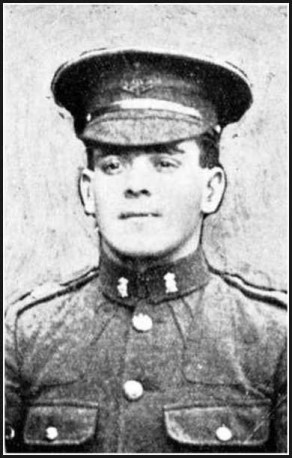
Private Tom CLARKE
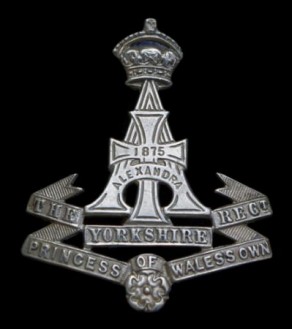
Regiment / Corps / Service Badge: Alexandra, Princess of Wales’s Own (Yorkshire Regiment)

Divisional Sign / Service Insignia: 7th Division
Data from Soldiers Died in the Great War 1914 - 1919 Records
Soldiers Died Data for Soldier Records
Surname: CLARKE
Forename(s): Tom
Born: Skipton, Keighley, Yorks
Residence: Skipton, Yorks
Enlisted: Halifax
Number: 8796
Rank: Private
Regiment: Alexandra, Princess of Wales's Own (Yorkshire Regiment)
Battalion: 2nd Battalion
Decorations:
Died Date: 19/03/15
Died How: Died of wounds
Theatre of War: Home
Notes:
Data from Commonwealth War Graves Commission Records
CWGC Data for Soldier Records
Surname: CLARKE
Forename(s): Tom
Country of Service: United Kingdom
Service Number: 8796
Rank: Private
Regiment: Yorkshire Regiment
Unit: 2nd Bn.
Age: 24
Awards:
Died Date: 19/03/1915
Additional Information: Son of Thomas Henry and Priscilla Clarke, of 20, Byron St., Skipton.
---
View Additional Image(s)
Additional Photo(s) For Soldier Records
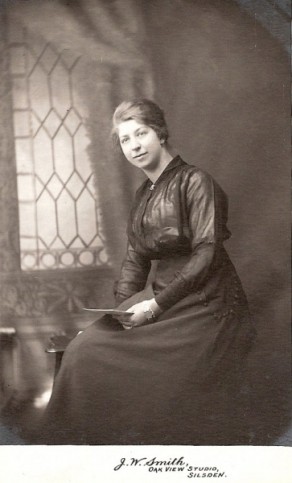
Emma Bancroft the sister of Sam and Joseph Bancroft
Emma was the fiancée of Private Tom Clarke who died of wounds on the 19 March 1915
Courtesy of Roger Bancroft
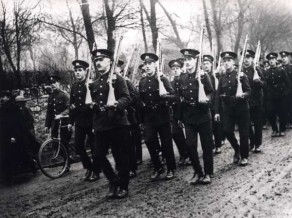
Men of 'B' Company
Men of 'B' Company 16th (Service) Battalion Prince of Wales's Own (West Yorkshire Regiment) (1st Bradford) marching to the funeral of Private Tom Clarke
Courtesy of Dr J. K. Elwood, Skipton
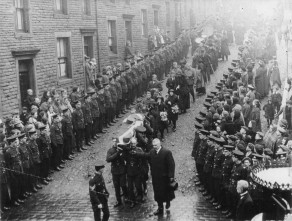
The funeral procession of Private Tom Clarke leaving his home in Byron Street, Skipton
Courtesy of Dr J. K. Elwood, Skipton
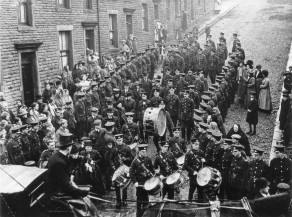
The funeral procession of Private Tom Clarke leaving his home in Byron Street, Skipton
Courtesy of Dr J. K. Elwood, Skipton
View Craven Herald Articles
View Craven Herald Articles

23 October 1914
Skiptonian’s Enthusiastic Welcome
Skiptonians are proud to honour townsmen who have done their duty to King and country, and last night they turned out in hundreds to give a real Craven welcome to Private T. Clark, of the Green Howards who, after spending several days in hospital at Ypres and a week at Dover, has returned to his native place convalescent.
Private Clark is a son of Mr. T. Clark, of Byron Street, a respected employee in the Gas Department of the Skipton Urban District Council. He was a reservist whose time expired shortly before the commencement of the War, and he rejoined his regiment immediately on the outbreak of hostilities. Those who have followed the course of events on the Continent, and kept an eye on the casualty lists, will be aware of the part the Green Howards – a regiment which has magnificent traditions to maintain – has so far played in this titanic struggle.
It was in the vicinity of Ypres, which for some time past has been the scene of a series of violent conflicts, that Private Clark received his injury. He was not the victim of a German bullet, but, much to his chagrin – inasmuch as it incapacitated him from further participation in the fighting – he fell down a trench and severely damaged his back. Prior to this he had been in the thick of it, but his thrilling experiences did not end with his removal from the firing line.
He was sent into hospital at Ypres, and while there a company of Germans raided the place, looting everything from eatables to valuables. Fortunately for Private Clark they missed him, or, if they were aware of his presence allowed him to nurse his injury unmolested.
Eventually , Ypres became “much too hot” on account of the attention paid to the place by German artillery, and the wounded were removed to various places for safety. Private Clark was sent to Ostend, but on getting within three miles of the seaport it became evident that the Germans, if not already there, were in close proximity, and the lights of the train were immediately extinguished. The only thing to do was reverse the engine and travel full speed to Dunkirk.
Private Clark informed our representative, to whom he willingly granted an interview a few minutes after his return, that he begged and prayed to be allowed to remain on the Continent, but as the German lines were between Dunkirk and his regiment – thus making it impossible for him to rejoin his comrades – it was deemed advisable that he should return to Dover. While he was at Dunkirk hostile air-craft hovered overhead, and in the distance could be heard the constant boom of heavy guns which betokened the progress of a big battle.
Like the majority of British soldiers who have returned from the front Pte. Clark is full of pity for the Belgians. They are, he said, the kindest and most inoffensive people in the world, and have developed a great liking for the English Tommy, which the latter is not slow to reciprocate. It went against the grain of the Allied Troops to have to leave the Belgians in their towns and villages to the tender mercies of the barbarous foe, but these brave people understood it was inevitable, and never failed to wish the soldiers God-speed by calling “Long live the English” – a phrase with which they have become familiar since the outbreak of the war.
Private Clark is anxious to return, and in order that, he might not have to remain in this country longer than is absolutely necessary, has taken care to bring with him his rifle and as much of his equipment as remains.
His return to Skipton was somewhat unexpected, but he nevertheless received a royal welcome. At the Station he was met by the Skipton Mission Band, a number of the 6th West Riding Reserve Battalion, and a large crowd. A bus was waiting and Pte. Clark occupied a seat on the front. Cheer after cheer greeted him as the procession made its way along Swadford Street, Keighley Road, and Middletown to his father’s home in Byron Street. At the bottom of the incline leading to the house he descended from the bus, and, surrounded by an enthusiastic crowd, made his way inside. The Band subsequently played the National Anthem, and after further rounds of cheering, which Pte. Clark acknowledged, the crowd dispersed.
27 November 1914
BACK TO THE FRONT
Private T. Clarke, of the Second Yorkshire Regiment (Green Howards), who was given a very hearty reception several weeks ago when he returned from the Front injured after participating in the fighting around Ypres, has rejoined his regiment and is once more at the Front. His relatives have received one or two communications which, however, give no indication as to his whereabouts, but one postcard states that the weather is very bad, and that practically all his pals “have gone.”
19 March 1915
NEWS OF A SKIPTON SOLDIER
Mrs. Clarke, of 20, Byron Street, Skipton, has received an interesting letter from Pte. C. Hewison, of the 2nd Battalion Yorkshire Regiment (Green Howards), containing news of her son, Pte. Tom Clarke, of the same Battalion. The letter is in the following terms:–
“I am asked by Tom to write as he is busily engaged in the firing line. He has my address and I have his, so that we can write to each other’s parents in case anything happens to us. Tom is away from us just at present, and when I was having a talk with him yesterday he asked me to drop you a line. This I am glad to do, and he asked me to state that he is in the best of health. Myself, with the others in our Company, must say that he is a very daring character, and when there is anything to be done that causes one to expose himself in the sight of the enemy he is always the first to volunteer for the job. Some of these jobs are very risky, such as repairing barbed wire whilst being fired at by the enemy, also star-shells going up which light our front and cause the enemy to take a good shot at anyone who is exposing himself.
"Both Tom and our Sergt. Major have been going right out very near the German trenches at night to try to either capture or kill any of the enemy's snipers or patrols who happen to come out in front of their trenches. Last week I and a comrade were in an advanced trench at dawn, and owing to heavy fire could not come out because it had got too light and the enemy could see us. Our way then was to go through a communication trench full of wire and mud. We were just talking of having a wet job when ‘Nobby’ (Pte Clarke) came up to us with two pairs of rubber knee boots, saying we had to go through the communication trench. "Nobby " got on to the top of the trench and calmly walked over to our day trench, although but a short distance away from the enemy. Tom very adores hearing his proper name, as all Clarkes in the Army are called "Nobby," but now we have christened him ‘Sniper,’ because during the day he goes out with the Sergt. Major firing at the enemy from a wall in front of where we get when out of the trenches.
"We are moving from here to-morrow and from what we make out are preparing for another charge, so hope for the best of luck and safe return when such a time comes. Whist writing this letter in the attic of an old barn I was ordered to come down below to shelter from the enemy's shells which were hitting close by, so you see we are never safe – even when away from the trenches, which is supposed to be our rest. At this barn we had eight shot with shrapnel which hit below the roof. Tom always seems to be happy when I see him.”
Since receiving the above letter Mrs. Clarke had forwarded a post card despatched from a Field Post Office on March 12th, intimating that her son had been admitted into hospital wounded. He promised to write at the first opportunity. This is the third time Pte. Clarke has been wounded.
Yesterday (Thursday) Mrs. Clarke received a letter from her son from the 18th General Hospital, Boulogne Base, Ward 8. It states the he has been badly wounded, having been shot through the back, and might not get the use of his legs back for a long time. He might be sent home soon, was pretty comfortable, and being well cared for.
26 March 1915
SKIPTON SOLDIER DIES OF WOUNDS – Pte. T. Clarke, Green Howards
It seems but a short time since a crowd of enthusiastic Skiptonians welcomed Private T. Clarke of the Green Howards, on his return from the front injured. On Tuesday they saw him carried from the home of his parents in Byron Street and buried with all the honours due to those who give their lives in service of King and Country. Private Clarke was known to his regimental comrades as ‘Nobby’ and was very popular among them. So much of that was gathered through an interesting letter published in these columns last week. It was written to Mrs. Clarke by a friend of her son who was in the firing line and had no time for correspondence, and was typical of ‘Tommy’ in its nonchalant breeziness.
It referred to Pte. Clarke as being in the best of health and spirits and a very daring character, gave chatty details of trench exploits, and concluded by referring to preparations which were in progress for “another charge.” At the time of writing no official information as to how or where Pte. Clarke sustained the wounds which proved fatal had been received by the family. It seems pretty certain, however, that the operations anticipated in the letter to Mrs. Clarke were the last in which the unfortunate young fellow participated.
A few days later a post card from a field hospital conveyed the intelligence that he was wounded. This was followed by a letter received last Thursday in which Pte. Clarke intimated that he had been wounded in the back and temporarily lost the use of his legs, but was comfortable, well-cared for, and “hoped to be home soon.” When this communication was written Pte. Clarke was in the general hospital at Boulogne. His death took place at Netley, however, and was notified to the parents on Friday afternoon. The body reached Skipton for interment late on Saturday night.
Pte. Clarke was 24 years of age. He spent seven years with the Colours and had just commenced his five years term of service in the Reserve when war broke out. Rejoining immediately, he was at the front with his regiment before hostilities had been very long in progress. He experienced more of the “slings and arrows of outrageous fortune" than most men, and was twice in hospital injured or wounded, before he was carried there for the last time.
Pte. Clarke met with his first mishap – an injury to his back through falling down a trench in the neighbourhood of Ypres. It was here that the Green Howards, true to tradition, made a magnificent stand against overwhelming odds, and played a noble part in checking the German dash to Calais. Pte. Clarke had some exciting experiences while in hospital. At Ypres the Germans raided the institution and looted everything from tables to valuables. Fortunately they missed Pte. Clarke, or if they were aware of his presence, allowed him to nurse his injury unmolested. Eventually the hospital at Ypres had to be abandoned on account of the enemy’s shell fire, and Pte. Clarke was sent to Ostend. On getting within three miles of the seaport it was evident that if the Germans were not already there they were in close proximity, and the lights on the train were immediately extinguished, the engine reversed and full speed made for Dunkirk. It was after these adventures that Pte. Clarke spent a few weeks at home recuperating. Soon after his return to the front he was wounded, but not seriously, and after a short stay in hospital resumed his place in the trenches.
Since then occasional letters have been received from him. In one of the last of them he stated that the Battalion was in an advanced position and in the thick of all the trouble. Incidentally he mentioned coming across Frank Luty from Skipton whom he took to see his brother Arthur. As to the duration of the War he thought they could continue singing ‘It’s a long, long way to Tipperary,’ but predicted the Allies would make a bold bid in the Spring. A day or two before writing this letter 50 shells burst within a radius of 300 square yards. One, quite close to Pte. Clarke, struck a wall and covered him with debris. There had also been several charges – especially hot work in view of the fact that the enemy were only 200 yards away. Towards the conclusion of his letter Pte. Clarke declared that he was in the best of spirits and could not grumble at his luck, “but one never knows when his turn is coming.” His turn has come all too soon.
Pte. Clarke, one of three brothers serving with the Colours, was a good marksman, and on more than one occasion won regimental trophies.
THE FUNERAL
Impressive scenes were witnessed on Tuesday when Pte. Clarke’s remains were interred with full military honours at Waltonwrays Cemetery shortly before one o’clock. About 150 men of ‘B’ Company of the 16th West Yorkshires (1st Bradford’s) in command of Captain Rhodes, took up their places on each side of Byron Street. Opposite the house of Pte. Clarke’s parents were drawn up the firing party under Sgt. Ainsworth, and the Battalion Bugle Band, in charge of Drum Major Cooper. All around the hearse which waited in Duckett Street stood a squad of about twenty khaki clad soldiers representing the 6th Service and Reserve Battalions of the Duke of Wellington’s West Riding Regiment.
The members of the Bradford Battalion supplied the bearer party, and a murmur of sympathy went up in the crowd as they appeared, carrying shoulder high the coffin covered with the Union Jack and surmounted by Pte. Clarke’s cap and bayonet. Behind came the sorrowing family, including two of deceased’s brothers and a cousin who are serving with the Colours. Most of the Skipton Mission Band are away on Military duty, but Mr. F. Metcalfe had assembled a number of musicians and to the solemn strains of the Dead March from Saul the cortege moved off in the direction of Christ Church.
Sackville Street and Keighley Road were crowded with sightseers, the mills in one or two instances extending the dinner hour a short period in order that the operatives might pay their last tribute to a fellow townsman who had died doing his duty. Blinds were drawn all along the route and many of those who lined it were visibly affected. Perhaps one of the saddest men in the whole concourse was Private Clarke’s old schoolmaster, Mr. Thomas Massey. This is the second of his ‘ boys’ who have been killed in action, and though their deaths are such as bring honour to their old school, the man who taught them feels it keenly.
At the gates of Christ Church the cortege was met by the Rev. R. Thorman (vicar), the Rev. A. B. Million (curate), and a surpliced choir. Inside there was a large congregation and as the procession entered by the west door the organist (Mr. J. L. A. Firth) played ‘0 Rest in the Lord’. During the service, which was impressive in its simplicity, the coffin rested at the foot of the Chancel steps. The first portion of the burial service was read by the Rev. A. B. Million, the prayers by the Vicar, and appropriate hymns were sung. While the coffin was being carried out of the Church the organist played the ‘Dead March.’
There was a large assembly to witness the last rites at the cemetery. The Committal having been read, the firing party took up their positions on each side of the grave and discharged three volleys. Then the bugle band followed with the ‘Last Post,’ admirably sounded, and a touching ceremony came to an end.
Most of the floral tributes were from the family and friends, but there was one of melancholy interest. It was inscribed ‘With deepest sympathy from the wife of a dear comrade who was killed in action at Neuve Chapelle March 11th.’ Though great her own, this noble woman was not unmindful of another’s sorrow.
24 March 1916
CLARKE – In memoriam of Tom Clarke, of the 2nd Yorkshire Regiment, died March 19th, 1915, at Netley Hospital of wounds received at Neuve Chapelle.
What more glorious death than to die
for Home, King and Country?
From Father, Mother and Family, 20, Byron Street, Skipton.
16 March 1917
SKIPTON FAMILY’S SECOND BEREAVEMENT – PTE. ENNIE CLARKE KILLED
We regret to say that Mr. and Mrs. T.H. Clarke, 20 Byron Street, Skipton, have suffered a second bereavement in the war by the death in action on the Western Front of their youngest son, Pte. Ennie Clarke, of the Duke of Wellington’s Regiment. Mr. and Mrs. Clarke’s eldest son, Pte. Tom Clarke, of the Green Howards, was killed over a year ago, and their two other sons, Sapper Sidney Clarke and Pte. Fred Clarke, are both at the Front, the former with the Royal Engineers, and the latter with the Duke of Wellington’s Regiment.
Pte. Ennie Clarke, who was only 19 years of age, enlisted on November 15th 1915, and went to France about a month ago. He was apprenticed to the trade of bookbinding with Messrs. Edmondson and Co., but for something like 12 months before joining the Army he was assistant at the Skipton Stationery Company’s shop (the ‘Craven Herald’ proprietors).
In a letter to the parents, Captain R.C. Prince says:– “It is with the greatest regret I have to inform you that your son was killed in action on March 1st. He was holding a post when a shell burst and killed him instantaneously. Your son was a splendid soldier, and I feel his loss very much, as I saw a lot of him and he was always a willing lad. Please accept my deepest sympathy.”
Pte. H. Davis, another Skipton soldier, has written to Mr. and Mrs. Clarke as follows:– “It is with great sympathy that I have to break the sad news to you of the death in action of your dear son Ennie. I am sure it will come as a great blow to you, as it has to all of us, but it might relieve you a little to know that death was instantaneous. I believe it was from shell shock. He was a great soldier, loved by all of us, and we all send you our deepest sympathy in your sad bereavement.”
16 March 1917
CLARKE – In memoriam of Tom Clarke, of the Yorkshire Regiment, died March 19th 1915, at Netley Hospital of wounds received at Neuve Chappelle.
Days of sadness still come o’er us,
Hidden tears oft time flow;
But memory keeps our dear one near us,
Although he died two years ago.
From Father, Mother and Family, 20 Byron Street, Skipton.
26 October 1917
IN MEMORIAM – BROUGHAM STREET SCHOOL HEROES
At the Congregational Church, Skipton, on Tuesday evening, an impressive musical service was held in memory of the teachers and old scholars of the Brougham Street Council School who have fallen in the first three years of the war. Particulars of the deaths of these brave lads have appeared in our columns from time to time, and their names are as follows:– Willie Barraclough, C.D. Bennett (teacher), Arthur Bruce, Sam Cairns, Cyril Calvert, Ennie Clarke, Tom Clarke, Harry Ingham, Tom Langman, Reggie Pollard, Lewis Sedgwick, Joe Stewart, Harry Tindall (teacher), and J.W. Varley.
There was a large and sympathetic congregation, including relatives of those in whose honour the service was held. Conducted jointly by the Rev. L.H. Gaunt and Mr. A. Townsend (headmaster of the school), the service, in addition to special prayers, hymns, collects, &c., comprised anthems by the Brougham Street School Old Scholars’ Choir (under the direction of Mr. Townsend), solos by Miss D. Wear and Mr. Clifford Townsend, and an address by Mr. Gaunt.
In a few introductory remarks Mr. Townsend explained the object of the service, which he said was one of praise rather than of sorrow for the splendour of the lives that had been laid down. – The anthems were ‘O God, protect with Thy strong hand’ (Greig), ‘Rest for the Weary’ (Gounod), ‘The Lord is my Shepherd’ (Smart), and ‘Peace to the Souls of the Heroes’ (Callcott), and in all these and in Nicholson’s setting of the ‘Magnificat’ the girls’ voices blended with pleasing effect, the singing being marked by a very fine tone and clear enunciation, showing evidence of careful training. Miss D. Wear sang most acceptably the exacting solo ‘I know that my Redeemer’ (Handel) and Mr. Clifford Townsend gave a meritorious interpretation of ‘The trumpet shall sound’ (Handel). In addition to playing the organ accompaniments with the customary taste and efficiency, Mr. W.H. Green contributed as a solo the ‘Hallelujah Chorus.’
In his address the Rev. L.H. Gaunt expressed his pleasure that the Congregational Church should have been used for a service of that kind and said he would rejoice if it could be used more frequently for public gatherings in which not only comparatively small circle of their own congregation might join, but in which the whole town might feel that it had some part. He also expressed his agreement with what Mr. Townsend had said as to the view they ought to take of the death of their boys, and said he felt that the Bishop of London – despite the fact that he had been taken to task for his expression of opinion – was right when he said that they ought not to think of the death of their boys as sheer calamity and overwhelming sorrow. They ought to think of them as having made a sacrifice bravely and heroically at the call of their country and for humanity, and those who were left behind to cherish their memory would honour them best by thinking of that sacrifice as a victory and not as a disaster; and their remembrance of them should come as a call to follow their example, to live so that they would be worthy of the sacrifice of their loved ones, and to bring to their lives into harmony with the great high note that they had struck in their sacrifice. They thanked God for what their boys had done and suffered, and most of all for what they had been and were now, and to ask His grace to follow in their train.
A collection was taken on behalf of the proposed new memorial of the Brougham Street School, which will probably take the form of a scholarship fund.
View West Yorkshire Pioneer Articles
View West Yorkshire Pioneer Articles

23 October 1914
SKIPTON CRACK SHOT WOUNDED IN ACTION
Letters from Private T. Clarke
Yet another Skiptonian has been wounded in action. A few days ago Mr. and Mrs. Clarke, of Byron Street, Skipton, received news from their son, Private Tom Clarke, that he was in a French hospital, having sustained injury through the bursting of a shell. Private Clarke, whose photograph we reproduce, is well-known in Skipton, and at the outbreak of hostilities was employed in Messrs. Hewitt’s weaving shed, Broughton Road. He was called up as a member of the 1st Reserve, having completed seven years’ service in the Army, being formerly attached to the 19th Yorkshire Regiment (Princess of Wales’ Own), more popularly known as the ‘Green Howards’. He spent some time in Egypt and subsequently in Guernsey, but just prior to his discharge his regiment proceeded to India, and Private Clarke was drafted into the 2nd Yorkshire Regiment. On August 5th, soon after the commencement of the war, he proceeded from Skipton to Richmond, and from thence to Southampton, leaving England with the Expeditionary Force. He, however, was one of a large number who were ordered to return to these shores, and had to wait in Southampton for horses, etc., and for the further drafting of his old regiment, which has been stationed in sections at Malta and Gibraltar. About three weeks ago he again sailed for France, and the next news of him was contained in the following letter:–
Dunkirk, France.
“Just a hurried line to let you know I am still alive, but in very much pain. I can just sit up enough to write this letter. We have had a very rough time, and been surrounded by the Germans at Offres in Belgium. One hundred came into the hospital where I was and stole all the bread, also took all the money from our wounded. Big battle today. Been very lucky – had injury, but just missed the pelvis bone and the left kidney. Will be glad when better to have another shot at them. They are very cruel devils. I will have lots to tell you upon return. May get invalided home yet if I don’t get better soon, as we had to be brought from a hospital in Belgium, because the Germans were firing the town, and were expected to come here. If not better soon will come home, but want to stay out here. You would not believe how cruel these Germans are. Hope to beat them, as we are surrounded here. I have a piece of a German’s coat whom we brought down by rifles from an aeroplane; also I cut a piece of a horse’s mane off one of those we captured from General Von Kluck’s Army… Having rough time but happy as can be. Just been carried out of bed and fired on a German aeroplane with one of the Belgian rifles... I have not yet received any letters from you. Save these relics” (those above mentioned).
Private Clarke’s fiancée received a postcard, posted on October 16th, which reads as follows:– “Have been brought to Dunkirk in France from the hospital in the north of Belgium, because it was surrounded by the Germans and has since been blown up, so was lucky; got away the night before a big battle. Am anxious to get back at the Germans. Have got a few relics from dead Germans. Am giving this card to a soldier who leaves this hospital for Dover; hope you receive it. Tell mother news. May get better in a week.”
On Tuesday, Miss Emma Bancroft, of 11 Walker’s Place, Silsden, (Private Clark’s fiancée) received (with a few eliminations of a private nature) the following letter:–
Sandgate, Kent
“Have arrived in England with other injured and wounded yesterday, at 6 p.m. I will try to go back from here when better, but the doctor says he thinks I will have to go to our depot to wait until a draft goes from there. I was very mad when I had to come home, but the French doctor said I should be a while before I could carry my equipment, so he thought I would be better in England, than in danger at Dunkirk (France). I was first taken to a hotel which has been turned into a hospital at Offres, in Belgium, and about 100 Germans came in and took all our money, bread, etc., also took away their own wounded, and made as much noise as they could, so I was lucky. If they had known I was English they might have done me in. At 11 that night I was awakened from sleep, and carried off to station, as the town was in danger of shells; then put on the train for Ostend. After going three quarters of the way we heard big guns firing in and around the town, so we reversed the engine and put out lights, then went at top speed to Dunkirk again, where I have been in two hospitals. There was plenty of gun-firing around there three days ago. I was then cut off from my regiment, as the German line was between Dunkirk and my regiment, so I could not possibly get back if I had stayed in France. Well, I am trying to come home some time during the week, if they will allow me, as I can get attended to at the hospital in Skipton. I am now in bed, but hoping to be able to walk all right soon, so that I can get to come up to see you all. We had a rough time at the Front, but I enjoyed it and was always happy. Hoping I am back soon. I am sorry to say that our guide took us the wrong road, and caused the French to fire on us all night long in a pure mistake. There are some pitiful sights when the poor Belgians are compelled to leave their homes. We were very well received all over Belgium. I am now sleeping between two wounded Belgians. They are very popular with British soldiers. We cannot arrive at Ostend or Zeebrugge now as there is fighting at both places. We had a rough time at Ghent and near Antwerp, also several other places too numerous to mention.”
It would appear from the above missives that Private Clarke is not very seriously wounded, but we were given to understand yesterday (Thursday) that a War Office advice described his injuries as serious. It is interesting to note that as a crack shot his exploits have been highly commendable. He has won several trophies, and was considered the best shot in his battalion. One of the cups he won was in competition with 12,000 other entrants.
Last Thursday night Pte. Clarke arrived home. He was met at the station by the Mission Band, and escorted to his home by a long line of Territorials and the general public, who cheered loudly as the procession passed through the streets.
06 November 1914
SKIPTON WOUNDED SOLDIERS RETURN TO DUTY
Private Tom Clarke, of Byron Street, Skipton, who was injured in the vicinity of Ypres, and returned to Skipton on October 22nd, after alarming experiences in French and Belgium hospitals, left Skipton for his headquarters on Wednesday.
19 March 1915
SKIPTON MAN WOUNDED FOR THE THIRD TIME
Private Tom Clarke, of the ‘Green Howards,’ whose home is at Byron Street, Skipton, is in a Boulogne hospital, having received a somewhat severe wound in the back. This is his third experience in hospital since he went to the Front, his first injury being early in October, while he was wounded shortly after his return to the scene of hostilities. In a letter home Pte. Clarke says that he expects he will have to remain incapacitated for some time. We wish him a speedy and complete recovery.
26 March 1915
THE LAST POST: SKIPTON HERO DIES FROM HIS THIRD WOUND
BURIED WITH FULL MILITARY HONOURS
We much regret to announce the death of Private Tom Clarke of the 2nd Battalion Yorkshire Regiment (Green Howards), son of Mr. and Mrs. Clarke of 20 Byron Street, Skipton who died in Netley Hospital, Southampton from wounds received whilst fighting at the Front.
Pte. Clarke was well known in Skipton, and prior to the outbreak of hostilities was employed in Messrs. Hewitt’s weaving shed, Broughton Road. He was called up as a member of the 1st Reserve, having completed seven years’ service in the Army, being formerly attached to the 19th Yorkshire Regiment (Princess of Wales’ Own). He had spent some time in Egypt, and subsequently in Guernsey, but just prior to his discharge his regiment proceeded to India whence, owing to his approaching discharge, he did not go. Eventually he was drafted to the 2nd Yorkshire Regiment. On August 5th, soon after commencement of the war, he proceeded from Skipton to Richmond, and from there to Southampton, leaving England with the Expeditionary Force, but did not immediately proceed to the Front. He was one of the large number ordered back to these shores to wait in Southampton for horses, etc., and for the further drafting of his old regiment, which had been stationed in sections at Malta and Gibraltar.
HIS FIRST INJURY
About the beginning of October he again crossed the Channel and shortly afterwards his mother received a letter saying that he and his comrades had had a very rough time at ……… in Belgium, having been surrounded by the Germans, and that he had been wounded though luckily the bullet had just missed the pelvis bone and the left kidney. He also stated that he would be glad when he got better so that he could “have another shot” at the enemy. Our readers will remember that we published exclusively the correspondence received by his mother and fiancé, accompanied by a photograph, of the deceased man. It was on October 16th that Pte. Clark’s fiancée, Miss Emma Bancroft, of 11 Walker’s Place, Silsden, received a postcard from him which read as follows:–
“Have been brought to Dunkirk in France from a hospital in the north of Belgium because it was surrounded by the Germans, and has since been blown up, so was lucky; got away the night before the big battle. Am anxious to get back to the Germans. Have got a few relics from dead Germans. Am giving this card to a soldier who leaves this hospital for Dover, hope you receive it. Tell mother news. May get better in a week.”
Eventually Pte. Clarke was brought to England, and on Thursday night, October 22nd, arrived home. He was given a rousing reception, being met at the station by the Mission Band and cheered loudly as the procession passed through the streets. He gradually recovered from his injuries and ultimately returned to France.
THE LATE PRIVATE TOM CLARKE – AGAIN WOUNDED
On December 2nd Mrs. Clarke received another letter informing her that her son had again been injured whilst fighting at the Front, and was in hospital suffering from gunpowder in the eyes. Her fears as to his welfare, however, were allayed on receipt of a telegram sent on Friday, December 4th, with a brief message, “Am all right again – Tom.”
The last letter written by him was received a month ago last Monday night, and in it he stated:– “I think we are going to make a dash soon, so hope for the best of good luck. The Germans have dropped a good many shells near to us and killed one poor fellow and wounded another, so you will see that it is not all honey. It is a game of ‘You might be here today and gone tomorrow.’
HIS LAST LETTER HOME
Last Thursday night Mrs. Clarke received another communication concerning her son, which had evidently been written by a friend. It reads as follows:– “Dear Mother and Father, I am badly wounded, having been shot through the back, and may not get the use of my legs back for a long time. It will not be long before I am sent home, but wherever I am sent to I will let you know. I am pretty comfortable; so do not worry, because I am being very well cared for. With best love from your son, Tom.”
A TRAGIC MESSAGE
On Friday afternoon last, Mrs. Clarke received a telegram from the Netley Hospital, Southampton, informing her that No. 8796, her son, had died from wounds. The news was received in Skipton with very general regret, many residents recalling the presence of the smart young soldier in the streets of Skipton a few short months ago, when he was at home recuperating from his first injuries. Pte. Clarke was an excellent ‘shot’ having gained several trophies for marksmanship, which fact may account for his sniping ventures in addition to the ordinary work in the trenches. The sympathy of the inhabitants will go out to his parents and the other members of the family, so unfortunately bereaved, their only consolation being a glorious one – that he died for the honour and arms of his country.
THE FUNERAL
The interment of Pte. Clarke took place at Waltonwrays Cemetery on Tuesday afternoon and he was accorded full military honours. He is the first Skipton soldier who has been killed in the war to be buried at his native town, and hundred of people congregated in the neighbourhood of Middletown to pay a last tribute to one who has laid down his life for his country. The cortege was escorted by about a hundred and fifty men of ‘B’ Company of the Bradford ‘Pals’ Battalion, under Captain Rhodes, and also several men of the 6th (Reserve) West Riding (Duke of Wellington’s) Regiment. A band got together by Mr. F. Metcalfe, and the ‘Pals’ Battalion bugle band, were also present, and the procession was headed by a firing party, carrying their rifles reversed. It was a sorrowful sight, and one which will for long linger in the memories of those who witnessed it. In Sackville Street the children of the Brougham Street School (where the deceased attended as a boy) were drawn up, and the boys reverently uncovered their heads as the procession passed. As the cortege proceeded on its sad journey, the Dead March in ‘Saul’ was most impressively played by the band, and at the Christ Church gates it was met by the church choir, headed by Rev. R. Thorman and Rev. A.B. Million. The coffin, which was covered with the Union Jack, was borne into the church by members of the ‘Pals’ Battalion to the strains of ‘O Rest in the Lord’ feelingly played on the organ by Mr. J.L.A. Firth. A short service was held, after which the mournful procession resumed its journey to the cemetery. Hundreds of people lined the route, and it is probable that never before has such a large crowd of people been seen at Waltonwrays as the one which assembled round the grave of Pte. Clarke, while the sad service was being conducted. At the close, three volleys were fired over the grave, and the ‘Last Post’ was sounded. Sergeant Hansworth was in charge of the firing party, and Drum-Major Cooper the bugle band. The principal mourners were Mr. and Mrs. Clarke and family, while there were also a large number of friends present. Amongst the beautiful array of floral tributes was one “From the wife of his comrade who was killed at Neuve Chapelle on March 11th.”
[Pte. Tom Clarke's fiancée, Emma, was the sister of Sgt. Joseph Bancroft and Sapper Sam Bancroft who were both killed later in the war.]
24 December 1915
CRAVEN’S ROLL OF HONOUR – SKIPTON
Pte. T. Clarke, Green Howards, died at Netley Hospital from wounds received at Neuve Chapelle. Had been wounded on two occasions previously. Son of Mrs. T.H. Clarke, Byron Street, Skipton.
24 March 1916
In memoriam of Tom Clarke, of the 2nd Yorkshire Regiment, died March 19th 1915, at Netley Hospital of wounds received at Neuve Chapelle.
What more glorious death than to die for Home, King and Country!
From Father and Mother and Family, 20 Byron Street, Skipton.
16 March 1917
CLARKE – In memory of Tom Clarke, of the 2nd Yorkshire Regiment, who died March 19th 1915, at Netley Hospital, of wounds received at Neuve Chappelle.
Days of sadness still come o’er us,
Hidden tears oft-times flow;
But memory keeps our dear one near us,
Although he died two years ago.
– From Father, Mother and Family, 20 Byron Street, Skipton.
26 October 1917
SKIPTON
IN MEMORIAM SERVICE FOR THE FALLEN
An in memoriam musical service was held at the Congregational Church, Skipton, on Tuesday evening last in memory of the teachers and old scholars of the Brougham Street Council School, who have made the supreme sacrifice in the first three years of the war. Their names are as follows:– Willie Barraclough, C. D. Bennett (teacher), Arthur Bruce, Sam Cairns, Cyril Calvert, Ennie Clarke, Tom Clarke, Harry Ingham, Tom Langman, Reggie Pollard, Lewis Sedgwick, Joe Stewart, Harry Tindall (teacher), and J.W. Varley. Mr. A. Townsend, in explaining the objects of the service, said he hoped it would not be of a sorrowful character, but that they were gathered together to honour all the men that had laid down their lives.
Rev. L. F. Gaunt, in the course of a brief address, said that he fully concurred with the statement made at the opening of the service that their predominant thought should be one of trust and thanksgiving for those who had made the supreme sacrifice. They were not to think of those young lives as having been thrown away and lost. No true life would ever be lost, for it was a gift of God, and anything that came from Him could never really die. Standing one day this summer he had watched the field of daisies rippling in the wind, and had rejoined in their beauty, but even as he stood there a mowing machine had come and cut down all the flowers. It seemed a waste of life and beauty, but he remembered that the roots were still there and that the flowers would grow all the fairer and the stronger next year. So it was with those whom we described as having been cut down in their youth. The roots of life had not perished, but would bear flowers and fruit again. Our loved ones, who had passed away, could still be helped by our love and by our prayers. It was for those who remained to prove themselves worthy of the sacrifices that had been made so that at the end they might meet again without shame.
During the evening the following programme was gone through by the members of the Brougham Street Old Scholars’ Choir: Anthem, ‘O God protect with Thy strong hand’ (Grier); sentences and collects; anthem, ‘Rest for the weary’ (Gounod); hymn, ‘For all the Saints’; lesson; magnificat (S. Nicholson); hymn, ‘God of our fathers’; solo, ‘The trumpet shall sound’ (Handel), Clifford Townsend; ‘Hallelujah chorus,’ organ; solo, ‘I know that my Redeemer’ (Handel), D. Wear; anthem, ‘The Lord is my shepherd’ (Smart); hymn, ‘Was there ever kindest shepherd’; anthem, ‘Peace to the souls of the heroes’ (Callcott); hymn, ‘The day Thou gavest.’ During the evening a collection was taken, the proceeds of which are to be devoted to the proposed school memorial.
Comment on this Soldier Record
You can leave comments on this soldier record. Please note all comments will be manually approved before they appear on the website.

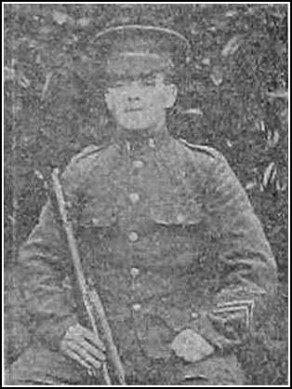
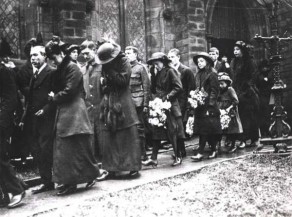
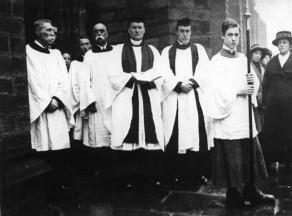
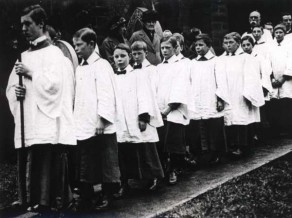
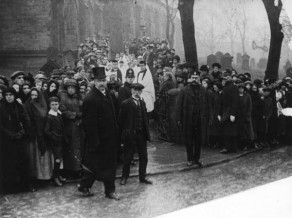
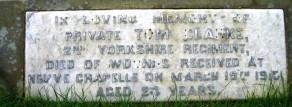
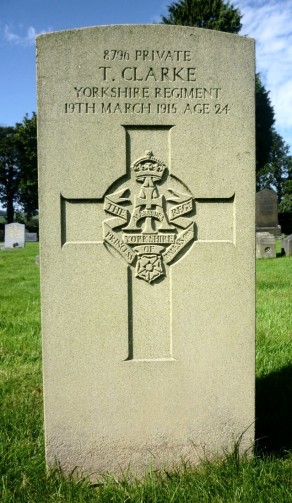
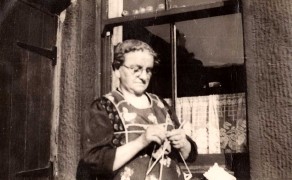
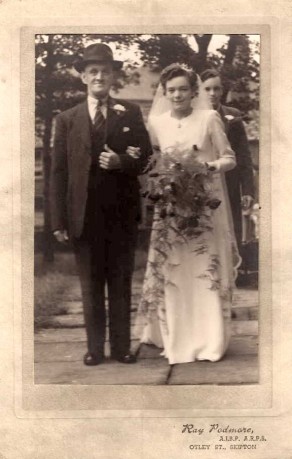



Tom was related to Arthur Clarke a RSM in WW1. Duke of Wellington’s Regt.
Arthur received several awards and his medals are held by the Regiment archivist in Halifax.